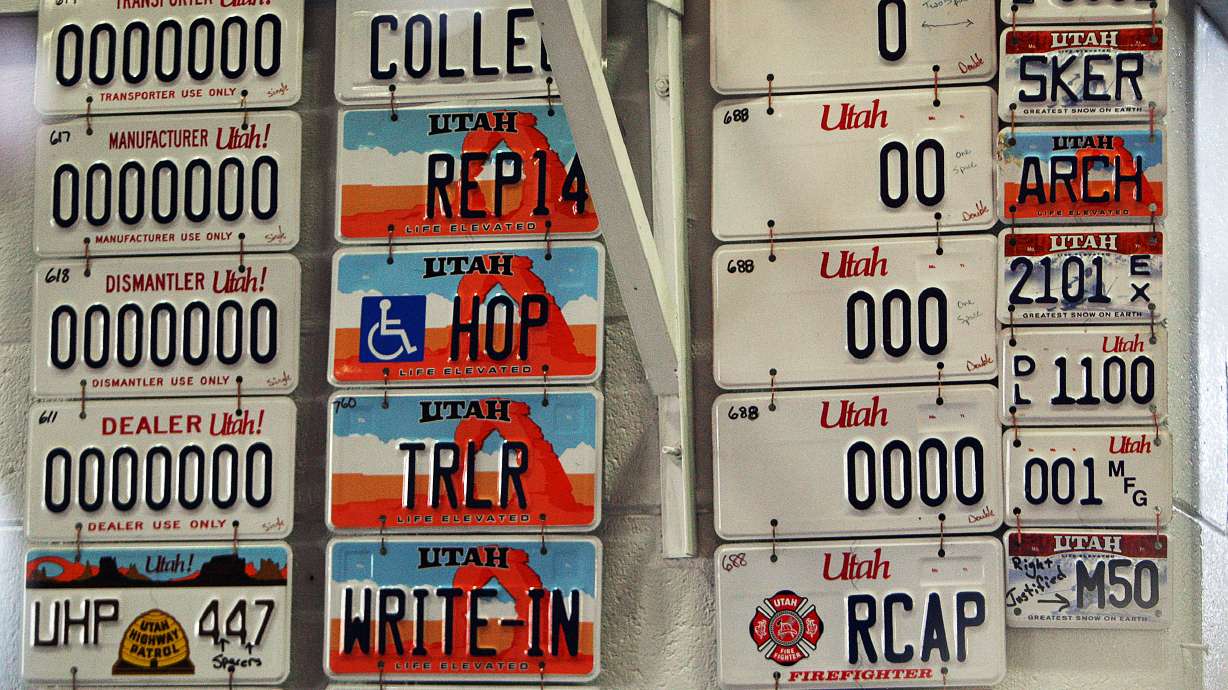Estimated read time: 4-5 minutes
This archived news story is available only for your personal, non-commercial use. Information in the story may be outdated or superseded by additional information. Reading or replaying the story in its archived form does not constitute a republication of the story.
SALT LAKE CITY — After a pair of failed attempts to pause Utah's personalized license plate program over concerns of future legal challenges, a bill that takes another route to the issue cleared its first challenge Wednesday following some additional changes.
Members of the House Transportation Committee voted 7-3 to advance an amended version of HB186. The bill, sponsored by Rep. Norman Thurston, R-Provo, seeks to outline in state code what would not be allowed on a personalized license plate, such as any combination of letters or numbers that is "indecent, obscene, profane or connotes certain other illegal activities or substances."
These, according to the bill, include profanities, "vulgar, coarse or irreverent" terms and anything that "naturally provokes a violent resentment." It also includes any "statement or use of innuendo, euphemism, double-entendre," as well as anything that "depicts or describes sexual or eliminatory activities or organs; and patently offensive or appears to pander or is used to titillate or shock," among other terms that wouldn't be allowed.
The intent behind the bill remains the same as in recent years. Thurston explained to the committee that he's concerned with how Utah approves personalized plates. He fears that the state denying a swear word could lead to a lawsuit over freedom of speech based on the current law.
"The problem is that court cases around the country, federal cases in particular, are finding that states cannot ban just whatever they want," he told the committee. "The First Amendment requires that any restrictions must be viewpoint neutral and cannot be vague — they have to be specific enough that people can understand the law."
The representative floated around somewhat similar bills over the previous two legislative sessions, although both of those called on the state to temporarily stop issuing any personalized license plates while the state waits for further legal clarification.
In 2022, his bill that included the pause sailed through the House of Representatives but the Senate failed to vote on it before the session came to a close. Then, last year, the same bill was altered to remove the provision that called for the pause while the rest of the bill went into law.
This year's bill doesn't seek to stop the program for any point in time; rather, it intends to codify what's considered appropriate that "still passes constitutional muster."
"Hopefully, we'll get it right this time and the Senate will love it and we won't have to talk about it again," he said.
His presentation led to a flurry of clarifying though, as constituents and lawmakers sought to understand the restrictions better.
Crystal Young, a member of the audience, asked about nuances within outlined banned terms. She asked if her partner could have a license plate that reads "69TESLA," because the bill lists No. 69 as a possible example of "indecent" language.
Thurston explained that the context of a request would be used in this situation. In that scenario, the plate shouldn't be rejected; however, it could be rejected if it's determined that the number is used indecently.
In the end, she said doesn't oppose the effort because it doesn't attempt to restrict "viewpoint diversity."
Questions about the bill sparked a pair of amendments during the meeting. The changes clarify that any slur is on the list of banned language and tweak the wording to say that the Utah Division of Motor Vehicles "shall consider how an objective reasonable person would interpret the requested language with no other context."
Others doubted the need for the bill, though.
Utah State Tax Commission Chairman John Valentine said the commission, which oversees the Division of Motor Vehicles, hasn't issued a stance on the bill yet, but there are "significant administrative concerns" with what's in the bill now because it shakes up the current standard that has "stood the test of time."
Rep. Kay Christofferson, R-Lehi, voted against the measure for similar reasons. He believes it has "a lot of good points," but that it's also a nonissue right now.
"At this point, why change it when it's not broken?" he said. "I'm inclined to just say let's keep this in mind, but let's hold off at this point."
But Thurston countered that it's why Utah should look at the measure now, so it avoids a legal conflict that it may lose without bolstering the law.
"Every other state that got sued had not been sued until they were sued," he quipped. "We haven't been sued yet. We don't know if that's going to happen sooner or later or not at all."
In the end, the committee voted in favor of the bill, sending it to the House floor for a full vote. The bill must be approved by the House of Representatives and Senate by March 1.
If approved, it'll go into law in May.










